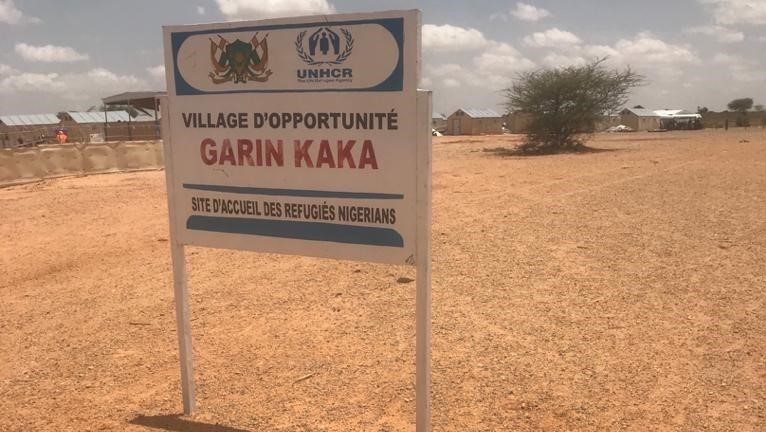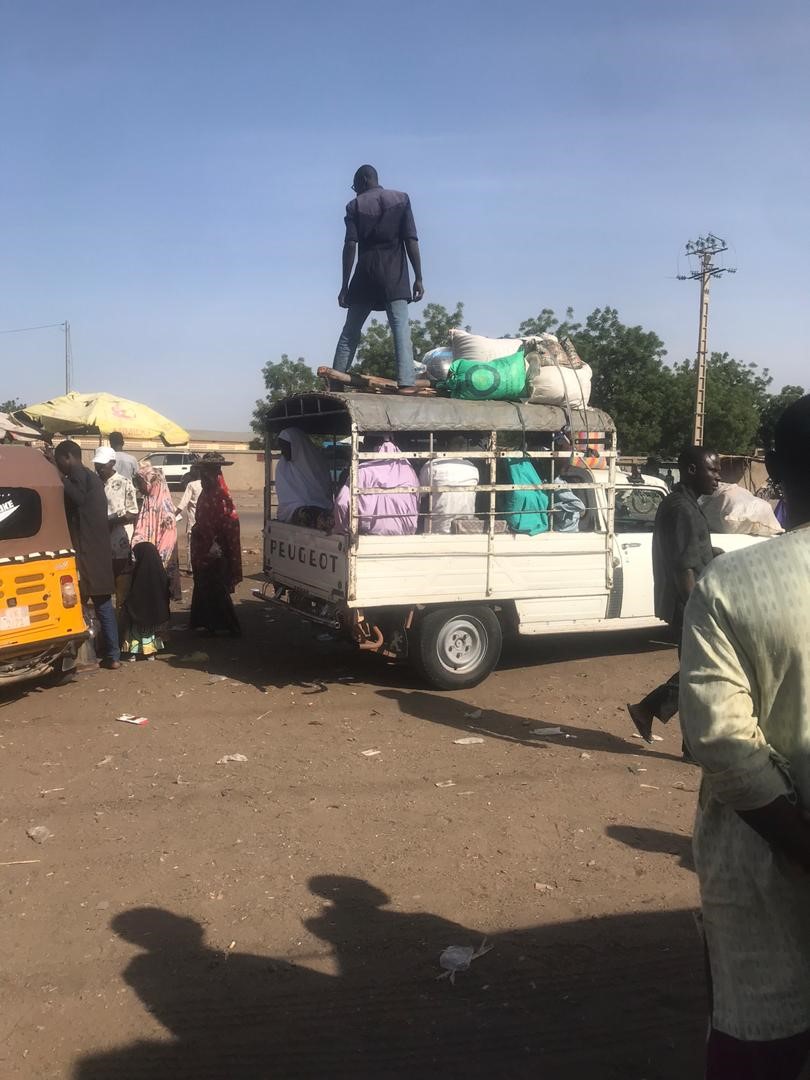70,000 Flee Terror Attacks In Nigeria’s Sokoto, Katsina States

Over 70, 000 Nigerians have fled the country to Niger Republic due to terror attacks by armed bands in the Northwest region of Nigeria.
As they deal with the loss of their homes and livelihoods, the refugees from Zamfara, Katsina and Sokoto states feel abandoned by the Nigerian government which has never sent officials to visit them.
According to the UN Refugee Agency (UNHCR) Office in Maradi, in April, 2020, more than 23, 000 people from Nigeria fled into Niger Republic for safety because their villages were either sacked or occupied by armed groups.
“Since the beginning of the crisis in Buzu, we have not seen any Nigerian officers but Niger Republic Army is always supporting us. We have a very good relationship with them.
In fact, our people prefer them to any Nigerian security agencies,” Nasiru Lawal, 32, replied angrily when HumAngle asked him about their relationship with the Nigerian government.
According to him, the Nigerian military has abandoned them in the hands of the merciless terror groups while Nigerien soldiers have helped them on several occasions.
“The Niger (Republic) soldiers helped more in our communities because the moment an alarm is raised, they quickly come to our rescue while our own Nigerian military can take several hours before they come,” Lawal said.
There was grief and anger on the faces of the refugees when HumAngle interviewed them on the military-civilian relationship in their localities.
Mallam Magaji, a refugee, said “the terrorists in our locality fear Niger soldiers,” adding that they (terrorists) were usually cautious in dealing with communities on the border with Niger Republic.
“This is because they know Niger soldiers will deal with them once they attack any Nigerien citizen. Nigerian soldiers are not doing enough to stop them,” he added.
Local Nigerian civilians on the border with Niger Republic said they trusted Nigerien soldiers more than the Nigerian Army as “they are trustworthy and anytime they promise to attack the terror groups, they fulfil it and give us maximum protection,” Magaji noted.
Relationship with hosts
The refugees also said that they enjoyed cordial relationship with their host community.
A refugee, Hamisu in Garin Kaka community, said “we are happy with our relationship with Nigeriens, they are very hospitable.
“The host community is assisting us with food, clothes and even borrowing our money, there is even intermarriage among us now.”
At Garin Kaka community, the natives and refugees shared their experiences of living together.
Issouf Moussa said, “We have a good relationship with them and as I am talking to you now, I married one Nigerian from Sabon-Birni. We have a child together.
“They are not strangers here and even before the conflict, we always regarded Nigerians as our brothers because we share so many things in common, especially our culture and tradition.”
Some refugees told HumAngle that they might remain in Niger Republic.
Hamisu, who hails from Buzu community of Isa Local Government Area in Sokoto State, said, “As I speak to you, we will not likely believe in any move by the Nigerian government to take us back to our communities. This is because none of them is visiting us to know our condition although they know we are here suffering in another country.”
Governors visit Niger Republic but bypass Nigerian refugees
HumAngle learnt that some Nigerian state governors have visited Niger Republic, especially Maradi, on several occasions but never visited the refugees in their camp.
The refugees decried their alleged abandonment by the Nigerian government. A refugee, Lawalli said, “Some of our Northwest governors came to Maradi to witness the traditional wrestling game hosted very close to Garin Kaka where we are living.”
“Sokoto State governor was among them but bypassed us on his way back home,” he alleged.
Another refugee, Hamisu added, said, “We were very excited when we sighted our state officials passing our camp hoping that they would check up on us but we later found out that they bypassed us.”
HumAngle learnt that since the people fled to Niger Republic, no government official – either from the Federal Government or state has visit the camp.
Mallam Amadu is the oldest refugee in Gidan Roumji village. He said “the government of Sokoto State has never come to see us, not even talk of sending any representative.”
The old man was crying while narrating the people’s disappointment with the Nigerian government to HumAngle.
“We supported (President Muhammadu) Buhari because we believed him as an old soldier whom we thought would do everything possible to protect us but just look at the security situation. It is always bad in the country.
“I have relatives who are not here and I don’t know whether they are still alive or have been killed by the group,” he said.
“We voted these people 100 per cent but this time, Mr President has nothing to tell us since he abandoned us and left us to suffer, ” Bashir who hails from Zurmi in Zamfara State, said.
“We prefer Niger Republic government to ours because their people are not complaining of insecurity, even those communities at the border area with Nigeria,” he added.
Another resident of Kwaddi village, Zurmi in Zamfara State, also expressed his concerns.
He said, “Since we came over a year ago, neither Zamfara State governor nor his officials have visited us. I don’t even think they know what we are going through.”
We don’t intend to return to Nigeria – Refugees

Due to a feeling of abandonment, some refugees told HumAngle that they did not intend to return to their communities.
Mallam Amadu, who fled from Sokoto State, said “We can’t go back to our communities because we are conversant with the situation in Nigeria.
“The groups still occupy our houses and farmlands and there is no security enough to move there to dismantle them.
“We feel more at home here despite some challenges. Niger Republic is safer and more comfortable for us than our country home.
“Nigeriens integrated with us very well and they are very hospitable. They agreed to marry our daughters and even allowed us to marry them. So, we are living happily with them here,” he said.
Saadatu Tanko from Sabon-Birni, who lost her husband and three sons to the conflict, said “there is nothing left for me in Nigeria. I have no relatives anymore.
“My maternal brothers are nowhere to be found and I have not heard from them at all.
“No one will force me to go back to that community because the place is very dangerous. I have honestly given up on the Nigerian security situation,” she said.
Some of the refugees expressed their fears and distrust for the Nigerian government with regard to safety in their communities.
Ali Barau from Shinkafi said, “It is no longer a story for Nigerian government to promise us peace and fail us woefully. We have had enough from them.
“We had been living in fear and anxiety for over five years before the situation got out of hand. If Nigerien authorities will offer us land to build our houses, farm and do businesses, we may not go back to Nigeria at all.”
Support Our Journalism
There are millions of ordinary people affected by conflict in Africa whose stories are missing in the mainstream media. HumAngle is determined to tell those challenging and under-reported stories, hoping that the people impacted by these conflicts will find the safety and security they deserve.
To ensure that we continue to provide public service coverage, we have a small favour to ask you. We want you to be part of our journalistic endeavour by contributing a token to us.
Your donation will further promote a robust, free, and independent media.
Donate HereStay Closer To The Stories That Matter




